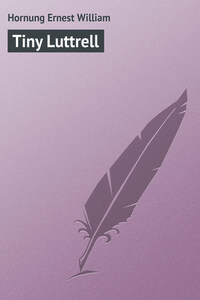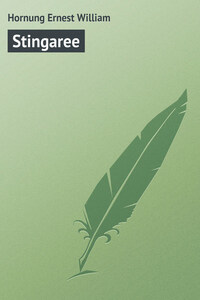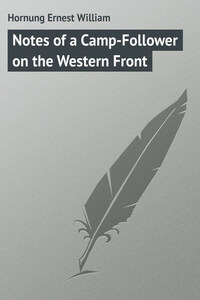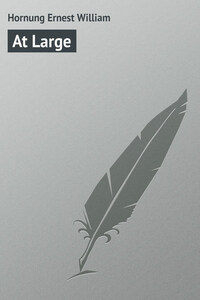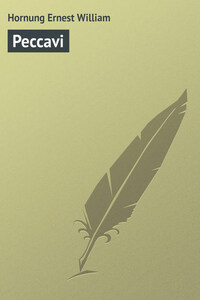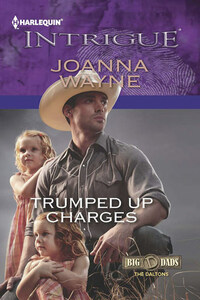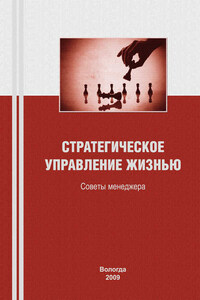Pocket Upton had come down late and panting, in spite of his daily exemption from first school, and the postcard on his plate had taken away his remaining modicum of breath. He could have wept over it in open hall, and would probably have done so in the subsequent seclusion of his own study, had not an obvious way out of his difficulty been bothering him by that time almost as much as the difficulty itself. For it was not a very honest way, and the unfortunate Pocket had been called “a conscientious ass” by some of the nicest fellows in his house. Perhaps he deserved the epithet for going even as straight as he did to his house-master, who was discovered correcting proses with a blue pencil and a briar pipe.
“Please, sir, Mr. Coverley can't have me, sir. He's got a case of chicken-pox, sir.”
The boy produced the actual intimation in a few strokes of an honoured but laconic pen. The man poised his pencil and puffed his pipe.
“Then you must come back to-night, and I'm just as glad. It's all nonsense your staying the night whenever you go up to see that doctor of yours.”
“He makes a great point of it, sir. He likes to try some fresh stuff on me, and then see what sort of night I have.”
“You could go up again to-morrow.”
“Of course I could, sir,” replied Pocket Upton, with a delicate emphasis on his penultimate. At the moment he was perhaps neither so acutely conscientious nor such an ass as his critics considered him.
“What else do you propose?” inquired Mr. Spearman.
“Well, sir, I have plenty of other friends in town, sir. Either the Knaggses or Miss Harbottle would put me up in a minute, sir.”
“Who are the Knaggses?”
“The boys were with me at Mr. Coverley's, sir; they go to Westminster now. One of them stayed with us last holidays. They live in St. John's Wood Park.”
“And the lady you mentioned?”
“Miss Harbottle, sir, an old friend of my mother's; it was through her I went to Mr. Coverley's, and I've often stayed there. She's in the Wellington Road, sir, quite close to Lord's.”
Mr. Spearman smiled at the gratuitous explanation of an eagerness that other lads might have taken more trouble to conceal. But there was no guile in any Upton; in that one respect the third and last of them resembled the great twin brethren of whom he had been prematurely voted a “pocket edition” on his arrival in the school. He had few of their other merits, though he took a morbid interest in the games they played by light of nature, as well as in things both beyond and beneath his brothers and the average boy. You cannot sit up half your nights with asthma and be an average boy. This was obvious even to Mr. Spearman, who was an average man. He had never disguised his own disappointment in the youngest Upton, but had often made him the butt of outspoken and disastrous comparisons. Yet in his softer moments he had some sympathy with the failure of an otherwise worthy family; this fine June morning he seemed even to understand the joy of a jaunt to London for a boy who was getting very little out of his school life. He made a note of the two names and addresses.
“You're quite sure they'll put you up, are you?” “Absolutely certain, sir.”
“But you'll come straight back if they can't?”
“Rather, sir!”
“Then run away, and don't miss your train.”
Pocket interpreted the first part of the injunction so literally as to arrive very breathless in his study. That diminutive cell was garnished with more ambitious pictures than the generality of its order; but the best of them was framed in the ivy round the lattice window, and its foreground was the nasturtiums in the flower-box. Pocket glanced down into the quad, where the fellows were preparing construes for second school in sunlit groups on garden seats. At that moment the bell began. And by the time Pocket had changed his black tie for a green one with red spots, in which he had come back after the Easter holidays, the bell had stopped and the quad was empty; before it filled again he would be up in town and on his way to Welbeck Street in a hansom.
The very journey was a joy. It was such sport to be flying through a world of buttercups and daisies in a train again, so refreshing to feel as good as anybody else in the third smoker; for even the grown men in the corner seats did not dream of calling the youth an “old ass,” much less a young one, to his face. His friends and contemporaries at school were in the habit of employing the ameliorating adjective, but there were still a few fellows in Pocket's house who made an insulting point of the other. All, however, seemed agreed as to the noun; and it was pleasant to cast off friend and foe for a change, to sit comfortably unknown and unsuspected of one's foibles in the train. It made Pocket feel a bit of a man; but then he really was almost seventeen, and in the Middle Fifth, and allowed to smoke asthma cigarettes in bed. He took one out of a cardboard box in his bag, and thought it might do him good to smoke it now. But an adult tobacco-smoker looked so curiously at the little thin cross between cigar and cigarette, that it was transferred to a pocket unlit, and the coward hid himself behind his paper, in which there were several items of immediate interest to him. Would the match hold out at Lord's? If not, which was the best of the Wednesday matinees? Pocket had received a pound from home for his expenses, so that these questions took an adventitious precedence over even such attractive topics as an execution and a murder that bade fair to lead to one. But the horrors had their turn, and having supped on the newspaper supply, he continued the feast in

